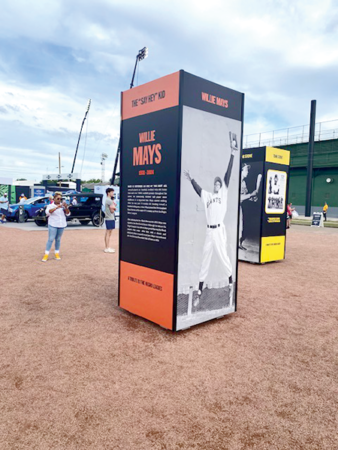This column comes with a forewarning — if you’re not a baseball fan, have little sense of sports royalty, and journey through life with little sentimentality, please turn the page and see what is on Jamie’s mind. Hopefully, I’ll catch you next week.
Despite my lifelong love affair with sports, I am not one to subscribe to athletes being ‘heroes.’ Webster describes the word as “a figure in mythology and legend renowned for great strength, courage, and daring, celebrated for special achievements and tributes.”
Indeed, athletes can often fit this description, but my hero classification is reserved for those who save lives, protect the public, elevate the community, and raise their families to be productive, respectful human beings. That said, the accomplishments of athletes can be appreciated, cheered on, remembered, and bring joy and memories to those who watch from the sidelines.
Baseball was ingrained in my soul as a youngster, and I was captivated by the skills of the players I could watch on grainy black-and-white TV sets. From the moment I first watched him play, Willie Mays became my favorite player. At that time, I knew nothing of his background or the difficulties he encountered in a segregated era. What I knew was what I saw: He was good, and it was so much fun to watch him play the game.
I was fortunate to have seen him play in person, closely followed his career, and read many of the books and articles commemorating his exploits. While there are those that differ, he was widely regarded as the best all-around baseball player the game has seen. I have no argument with that assessment. There is no need to recite his legendary statistics defining his lofty status. If you’re a baseball fan, you know them; those that aren’t probably left this column paragraphs ago.
The news of May’s passing (June 18) came just two days before he was to be the focal point of Major League Baseball’s celebration of the Negro Leagues at Birmingham, Alabama’s Rickwood Field, built in 1910 and recognized as the oldest baseball field in the country. The event had been in the planning stages for several years, and it was hoped that Mays would be able to return to the field where he began his professional career as a member of the Birmingham Black Barons.
Personally, my admiration for Mays and awareness of the Rickwood game led to a road trip in March to see the venue first-hand, which was detailed in this column on March 13. That provided a wonderful experience that included sitting in the same locker room Mays once graced and being given a guided tour of such a baseball-storied structure.
Consideration was being given to returning to Birmingham for the June 20 MLB game featuring the San Francisco Giants and the St. Louis Cardinals but scoffed when uncertainty arose regarding May’s ability to attend the game. MLB was prepared to provide a medically equipped plane for the journey, but on the day before his passing, he made the notification he would not be able to make the trip.
Immediately, the Rickwood game took on even more meaning, and tributes to Mays poured in. When the announcement of his passing was made to the crowd at a June 18 Rickwood minor league game, tears flowed from fans in the stands. Watching at home, I was mesmerized and sat glued to the tube for several hours as memories of my favorite baseball player flashed by.
Yes, Willie Mays was 93 and had lived a very full life. But this was WILLIE MAYS!
Poet Maya Angelou once stated, “I’ve learned that people will forget what you said, people will forget what you did, but people will never forget how you made them feel.” From most everything spoken or written about Mays, that is exactly the sentiment rendered. No matter who you were, Willie Mays made them feel good.
Montoursville’s Tom O’Malley was a rookie with the Giants when he first met Mays.
“I was just a rookie in spring training, and Willie had been my dad’s favorite player. He was always around and loved to talk baseball, and it was really neat to have the opportunity to pick his brain. Those were special moments. He was not only a good baseball player but a good person as well.”
His famous over-the-shoulder basket catch in the 1954 World Series stands out most in people’s minds, but Willie just made people smile. He developed the basket catch and wore a cap a size too small so it would fall off his head when running. His rationale for both actions was that baseball was entertainment, and he wanted to give fans a reason to come back to the park to watch him play.
He got his first professional hit off Satchel Paige and his first MLB home run off Warren Spahn, both classmates of Mays in the Hall of Fame. He played stickball with neighborhood kids on the streets of New York, then bought them ice cream before he’d leave for a Giants game at the Polo Grounds. He sponsored Little League teams out of his own pocket. In retirement, at Halloween, he would hand out autographed baseballs to the trick-or-treaters visiting his home.
Tragically, Mays was not at Rickwood to glow in the festivities planned in his name. But he was watching from above, and those in attendance could feel his presence. They had to. I was feeling it in far away South Williamsport. Among my memorabilia is a plastic likeness of #24 in his basket-catch pose. That likeness was perched on the shelf above as this column was penned.




